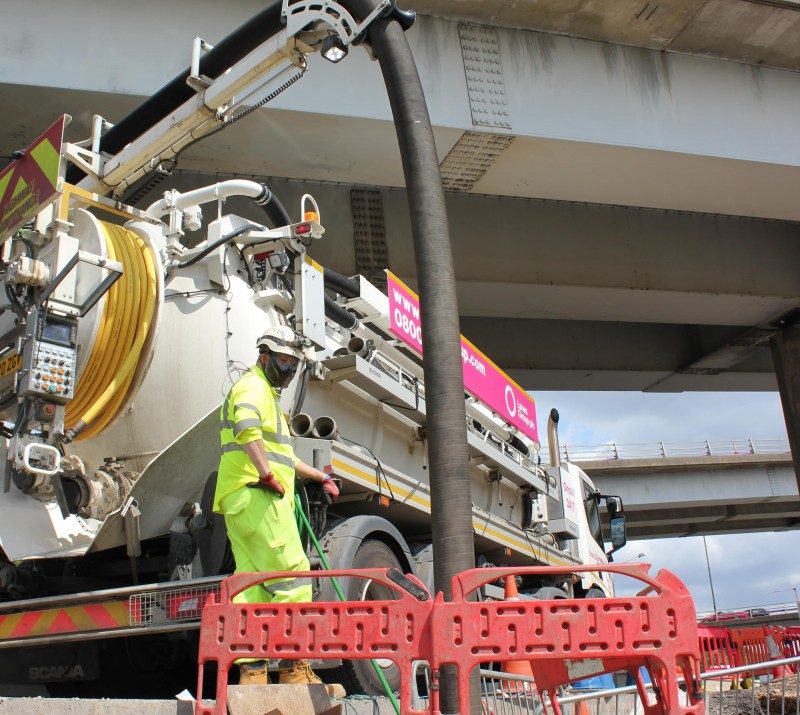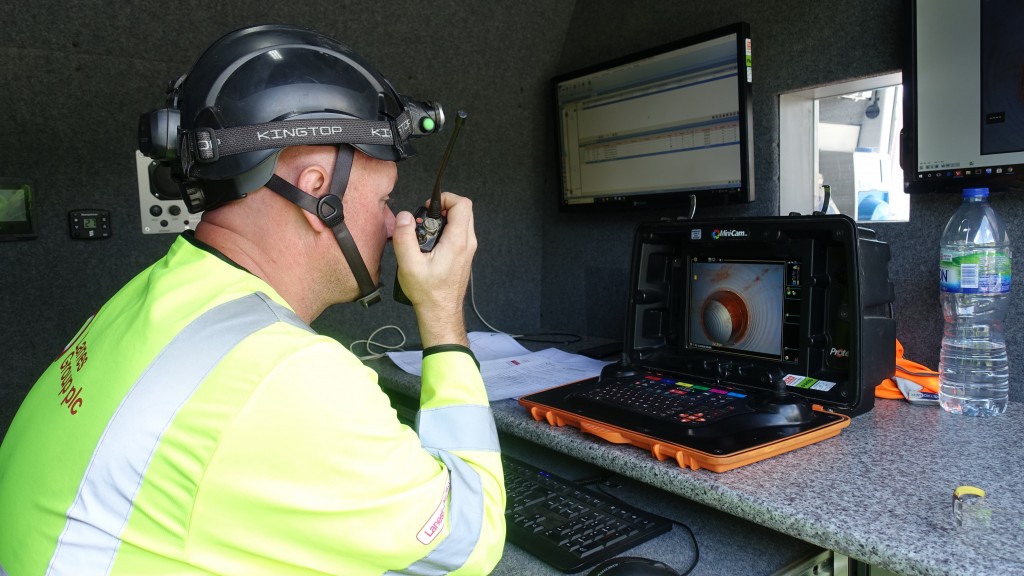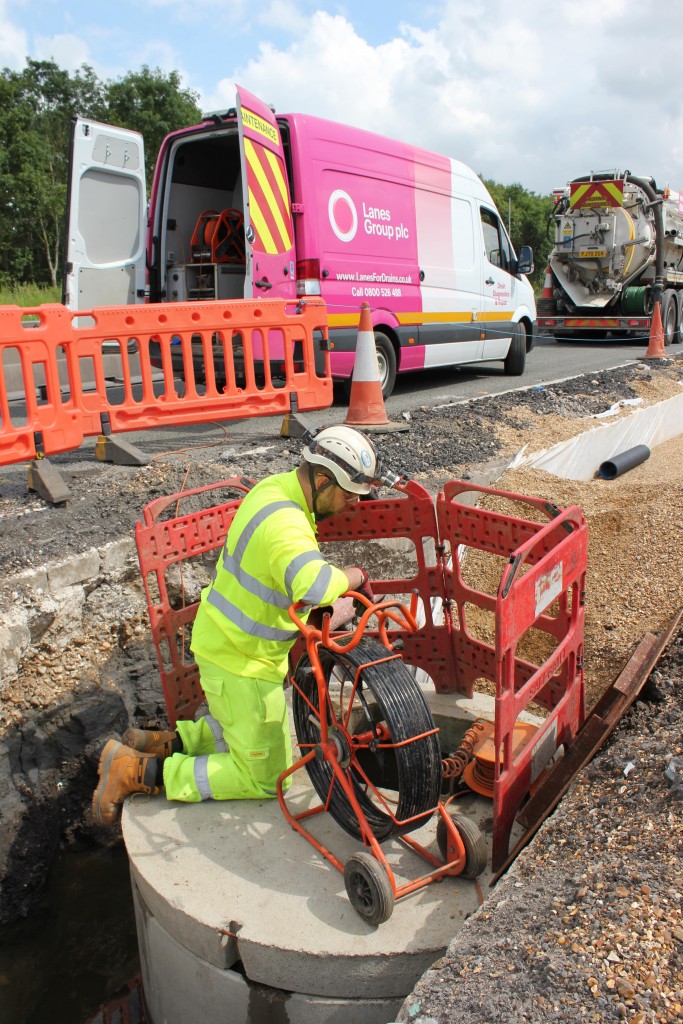Digital flows drive smart highway drainage solutions

New digital technologies developed by Lanes Group plc are creating more sustainable ways to develop and manage the UK’s highways network.
The national drainage and wastewater services specialist is providing highway construction and maintenance clients with more sustainable and faster ways to assess drainage assets.
And it is doing this by controlling the flow of data rather than water.
The need is urgent. The Intergovernmental Panel on Climate Change’s alarming warning, in August 2021, about how human activity is changing the climate at an unprecedented rate, is concentrating minds.
Digital drain advantage
Ben Forsyth, Strategic Development Manager at Lanes, says: “Now, more than ever, our highways clients want drainage survey data that’s accurate, consistent, rich in detail and delivered quickly.
“As adverse weather events become more unpredictable and volatile, there is much less time to wait. It’s one of the reasons Lanes has created a new national centre for drainage survey data processing.”
Located in Manchester, the fast-expanding service is already one of the largest of its kind in the UK.
Survey files are sent directly from our CCTV vans via the Cloud to the national centre, where one expert technician, or a dedicate team, can be responsible for a specific programme of work.
Ben Forsyth explains: “All our major highways survey processing is now carried out this way. A dedicated technician is responsible for obtaining shape files, the geospacial drainage data files, from National Highways, then loading them remotely onto our CCTV vans.
“The CCTV drainage engineer, sitting in a van on the M4, for example, then updates the shape files with new survey data and sends them back to Manchester remotely to be processed and then uploaded to HADDMS.
“Having this central survey processing resource is speeding up report turnarounds, improving consistency and allowing us to develop bespoke procedures and capabilities for individual clients.”

All major highway survey and cleaning projects carried out by Lanes are now supported in this way, including current and recent projects on the M4, M5, M6 and M60.
For example, for the M6 Junctions 13-15 Smart Motorway scheme, the company’s teams surveyed around 55 kilometres of drainage, recorded in 66 shapefiles, each corresponding to specific catchments, and containing, on average, 600-700 pipe runs.
The data gathered, processed and uploaded to National Highways’ HADDMs system is supporting more effective decision-making about how to ensure drainage is fit for purpose.
Lining up sustainability
Good data also underpins more sustainable methods for rehabilitating drains. Lining pipes and culverts, rather than digging them up and replacing them, saves money and releases much less carbon.
Installing liners inside pipes gives them additional strength. So they can withstand the pounding of increased traffic flows as well as increased water flows from heavier and more sustained rainfall.
“Our teams were the first to use this approach in a major scheme on a British motorway,” says Ben Forsyth. “They installed ultraviolet (UV) cured in place pipe (CIPP) liners during construction of the M6 Junction 16-19 smart motorway between Crewe and Knutsford in Cheshire.
“In just one section, between junctions 18 and 19, we lined 7.8km of pipe, ranging from 225mm to 600mm in diameter, with two lining teams working day and night to line up to 1000m of pipe per week.”
The only alternative, in this case, was replacing the pipes with new ones in deeper trenches, which would have been more costly, more disruptive, and carbon intensive.
Lanes carries out similar work for many local authorities. Pipe lining will become increasingly important to control the cost of drain maintenance and counter growing climate change threats.

Cleaning for capacity
The third critical drainage maintenance task is cleaning. Highway drains can become blocked by silt washed from verges and the carriageway. Water pooling on roads compromises safety and causes travel disruption.
Roads are often the first public assets compromised by sewer flooding during periods of heavy rain. Lanes is helping the UK’s largest water company rise to these challenges.
As Thames Water’s wastewater network services maintenance partner, it has developed the UK’s largest planned sewer cleaning programme, with climate change a key concern.
The starting point is, again, data capture. Reactive and planned sewer cleaning work carried out by Lanes feeds huge volumes of data into Thames Water’s sewer capacity and demand model.
This model has identified sewer cleaning priorities, directs the work of a Lanes sewer cleaning team with more than 175 personnel and a fleet of 70 jet vac tankers and CCTV survey vans.
The target set for 2021-22 was to clean 2,000km of sewers, equivalent to pipe linking London with Rome. Where planned cleaning has been carried out, emergency blockage clearances fell by 32%, internal sewer floods by 53%, and pollution incidents by 56%.
Thanks to the better understanding created by drainage data analysis, the next step is to even more flexibly target support towards communities with the highest flood risks.
And while data is key, Lanes’ ability to deploy the very latest specialist vehicles anywhere in the UK via its national network of 22 depots is also crucial.
From recycler jet vac tankers that reuse their water, improving sustainability and productivity, to super-sucker vacuumation tankers that can lift the heaviest sludge and dry materials, Lanes has equipment that can overcome the biggest highway drainage challenges.
Ben Forsyth says: “Combining the latest data capture and analysis techniques with drainage asset cleaning and rehabilitation technologies that deliver safe and productive solutions is fundamental to the future of highway maintenance.
“Lanes is pleased to be able to help tackle the unfolding challenges of climate change, and assist our clients in making critical decisions and the best use of resources to keep our roads safe and traffic flowing.”







